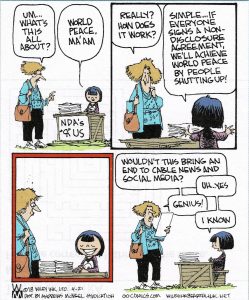Communism – a political theory derived from Karl Marx, advocating class war and leading to a society in which all property is publicly owned (Think Donald’s base, oligarchs, government and the proletariat in disarray; think data gathering corporations that know everything – even about each of us and that information is used to make billions of dollars without a penny owed directly to “the public.”)
Capitalism – an economic and political system in which a country’s trade and industry are controlled by private owners for profit, rather than by the state. (Think corporatism and actually owning the government as well thereby eliminating government altogether).
The crossbreed is the worst of both ideologies: The public at large owns nothing, not even houses, automobiles or privacy. The end result is controlled classism with a socialistic flavor, citizens having no real say in anything, and continuous class war.
What follows are examples of crossbreeding.
֎ [NEWSY] The internet has revolutionized how donors behave. People now give more frequently and in smaller amounts than ever before. But every time you donate online, there’s a processing cost. A Newsy analysis, published in partnership with Politico, found that the small donor revolution has also helped direct millions of dollars to the middlemen that process donations. While it’s a matter of cents on the dollar, those pennies can add up fast. And in recent years, as small-dollar donations have ramped up, credit card processing costs have exploded.
 Banks and data tech companies want in on everything and at the moment are getting what they want. Just today mariner received a ‘gift’ from Dish Network. The gift is a TV remote paired with Google’s voice recognition software. It won’t be installed. As to charitable donations online being skimmed by banks, mariner enjoys even more than usual covering that cost by writing a check to the charity and posting the donation through the Postal Service, with a wry smile while he does it.
Banks and data tech companies want in on everything and at the moment are getting what they want. Just today mariner received a ‘gift’ from Dish Network. The gift is a TV remote paired with Google’s voice recognition software. It won’t be installed. As to charitable donations online being skimmed by banks, mariner enjoys even more than usual covering that cost by writing a check to the charity and posting the donation through the Postal Service, with a wry smile while he does it.
Put in context the National Rifle Association (NRA), the fossil fuel industry, the government (owned by corporations), mega corporations like Amazon, Walmart, Google, Microsoft, AT&T, and other independent, do as they like multifunction, multinational corporations, and one realizes the citizenry has nothing to do or say about the US economy, its scruples or its original ‘freedom and justice for all’ myth.
Does the ‘public’ own anything? Does the ‘public’ share in GDP profits? Does the election process have any significant contribution?
Aside from citizens with enough excess resources to invest in capitalist ventures (Wall Street) or actually have enough assets to own a house not compromised by bank oversight, the citizenry is on a path to controlled communist social structures and little or no opportunity to share profit with capitalist corporations.
This is indeed a difficult circumstance for the general public. What makes the situation even worse is that the crossbreed feels no obligation to compensate for the global warming situation, environmental health, free medical support or anything else ‘free’ from the corporate-owned government, or the impact of automated intelligence (AI).
On the good side, it was an unusually warm, sunny day; mariner worked in his garden.
Ancient Mariner

